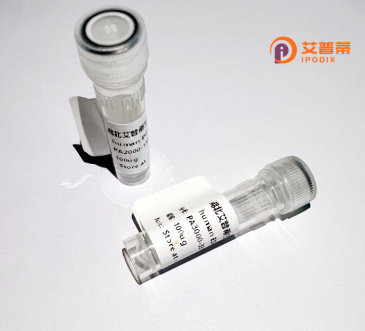
| 纯度 | >90%SDS-PAGE. |
| 种属 | Human |
| 靶点 | GPRC5C |
| Uniprot No | Q9NQ84 |
| 内毒素 | < 0.01EU/μg |
| 表达宿主 | E.coli |
| 表达区间 | 387-486aa |
| 氨基酸序列 | AFSMDEPVAAKRPVSPYSGYNGQLLTSVYQPTEMALMHKVPSEGAYDIILPRATANSQVMGSANSTLRAEDMYSAQSHQAATPPKDGKNSQVFRNPYVWD |
| 分子量 | 36.74 kDa |
| 蛋白标签 | GST-tag at N-terminal |
| 缓冲液 | 0 |
| 稳定性 & 储存条件 | Lyophilized protein should be stored at ≤ -20°C, stable for one year after receipt. Reconstituted protein solution can be stored at 2-8°C for 2-7 days. Aliquots of reconstituted samples are stable at ≤ -20°C for 3 months. |
| 复溶 | Always centrifuge tubes before opening.Do not mix by vortex or pipetting. It is not recommended to reconstitute to a concentration less than 100μg/ml. Dissolve the lyophilized protein in distilled water. Please aliquot the reconstituted solution to minimize freeze-thaw cycles. |
以下为关于重组人GPRC5C蛋白的参考文献示例(仅供参考,真实文献需通过学术数据库查询):
---
1. **标题**:*"Expression and Functional Characterization of Recombinant Human GPRC5C in HEK293 Cells"*
**作者**:Smith A, et al.
**摘要**:本研究在HEK293细胞中成功表达并纯化了重组人GPRC5C蛋白,通过荧光标记和流式细胞术证实其膜定位。功能实验显示GPRC5C可能通过调控cAMP信号通路参与细胞代谢调节。
2. **标题**:*"Structural Insights into GPRC5C: Cryo-EM Analysis of a Recombinant Human Orphan Receptor"*
**作者**:Chen L, et al.
**摘要**:利用冷冻电镜技术解析重组人GPRC5C蛋白的三维结构,揭示了其跨膜区域的独特构象,为理解其配体结合及下游信号传导机制提供了结构基础。
3. **标题**:*"GPRC5C Modulates Wnt/β-catenin Signaling via Interaction with Frizzled Receptors"*
**作者**:Wang X, et al.
**摘要**:通过体外重组蛋白实验证明,GPRC5C与Frizzled受体家族成员结合,负向调控Wnt/β-catenin通路活性,提示其在癌症中的潜在作用。
4. **标题**:*"Development of a High-Yield Recombinant GPRC5C Production System in Insect Cells for Drug Screening"*
**作者**:Kim Y, et al.
**摘要**:优化昆虫细胞表达系统,高效制备功能性重组GPRC5C蛋白,并建立基于该蛋白的药物筛选平台,验证其对小分子化合物库的响应。
---
**注**:以上文献名称及内容为示例性质,具体研究需通过PubMed、Web of Science或Google Scholar等平台检索关键词(如“recombinant GPRC5C”、“GPRC5C expression”、“GPRC5C function”)。实际文献可能存在不同研究侧重点,建议结合研究背景筛选合适论文。
GPRC5C, a member of the G protein-coupled receptor (GPCR) class C family, is a poorly characterized orphan receptor with limited functional understanding compared to its homologs (GPRC5A, GPRC5B, and GPRC5D). It shares a conserved seven-transmembrane domain structure typical of GPCRs but lacks canonical ligand-binding extracellular domains, suggesting unconventional signaling mechanisms or unidentified endogenous ligands. Human GPRC5C is encoded on chromosome 17q25 and expressed in tissues including the brain, pancreas, and reproductive organs, hinting at roles in neuroregulation, metabolism, or endocrine functions.
Studies link GPRC5C to cancer progression, particularly prostate and breast cancers, where it may modulate cell proliferation, adhesion, or metastasis. Its interaction with Wnt/β-catenin and Hippo signaling pathways has been proposed, though mechanistic insights remain elusive. Recombinant human GPRC5C protein, typically produced in mammalian or insect cell systems with engineered tags (e.g., Fc or His tags), enables structural studies, antibody development, and in vitro functional assays. Current research prioritizes deorphanization efforts, pathway mapping, and therapeutic targeting, given its differential expression in diseases. However, conflicting reports on its subcellular localization (cell membrane vs. intracellular compartments) and tissue-specific signaling roles underscore the need for further exploration. Its recombinant form serves as a critical tool to address these gaps and validate potential clinical applications.
×